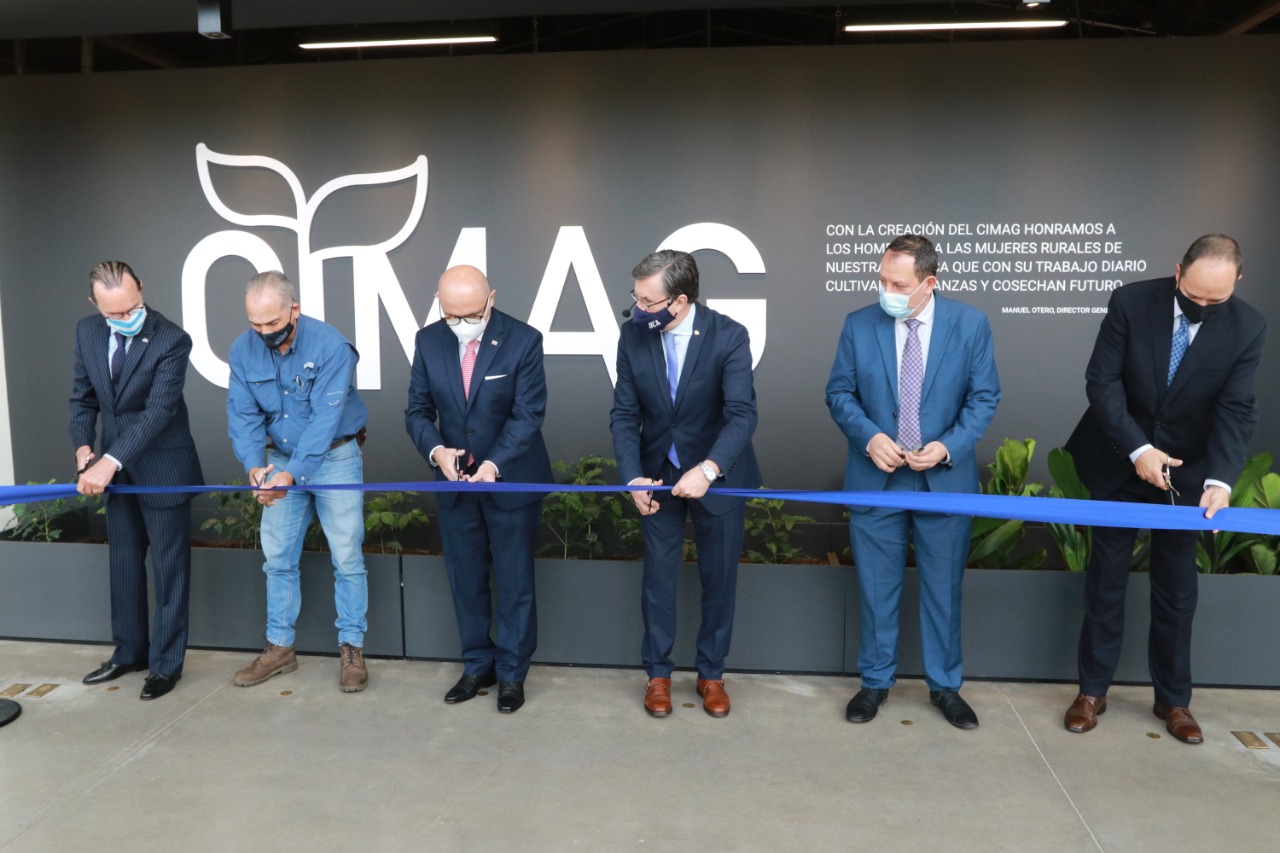CIMAG is one of the flagship projects of an IICA of open doors and includes innovations from companies like Bayer and Microsoft in a bid to demonstrate the benefits that cutting-edge technologies have for agriculture.

San Jose, 1 September 2021 (IICA). Rodolfo Solano, Minister of Foreign Affairs and Worship of Costa Rica; Renato Alvarado, Minister of Agriculture and Livestock of Costa Rica; Natasha Santos, Vice President, Head of Global Stakeholders Strategy and Affairs at Bayer; and Daniel Verswyvel, General Manager of Microsoft for Central America, inaugurated the Interpretive Center for Tomorrow’s Agriculture (CIMAG), through which the Inter-American Institute for Cooperation on Agriculture (IICA) demonstrates how digital technologies are capable of transforming and improving agriculture, rural life and food security in the Americas.
Manuel Otero, Director General of IICA, also participated in the event, along with the 33 ministers of agriculture of the countries of the hemisphere, who attended virtually.
CIMAG is one of the most representative projects of an IICA of open doors—an initiative through which the Institute (headquartered in Costa Rica) seeks to draw closer to its counterparts and significantly increase the impact of its work.
CIMAG demonstrates how artificial intelligence, the Internet of Things, 3D applications, robotics and other leading technologies can positively impact agriculture, and are key to reducing rural migration and for new generations to form an interest in professions in agriculture.
CIMAG is a true innovation center that links agriculture and education and is promoted by IICA in alliance with Microsoft, Bayer and Lego (through its Costa Rican distributor, Aprender Haciendo), among other companies. It underscores the key role of new technologies in the agriculture sector through virtual and interactive experimentation.
Costa Rican President Carlos Alvarado, who participated in the opening event of the Conference of Ministers of Agriculture of the Americas 2021 during which CIMAG was inaugurated, stated that the agriculture of our countries will face many challenges in the future in areas like sustainability and environmental resilience, inclusion, and the transformation toward digital agriculture.
“Without a doubt, this project will inspire new generations to see agriculture as an important activity in ensuring global food security and the economy, and that together with technology it could become a more productive and environmentally sustainable activity”, expressed the head of state.
“From Costa Rica, we respectively urge the Governments of the Member States of IICA to renew this inalienable commitment to decidedly support an agriculture that is respectful, that facilitates processes and that dignifies human beings—our citizens”, stated Foreign Minister Rodolfo Solano.
Among its technological advances, CIMAG offers a variety of exhibits in which private-sector firms put the different uses of their innovations on display.
“To enable the adoption of technologies on the farm that will allow us to produce more food more sustainably and trigger the well-being of rural areas, we have developed a fun, educational space for CIMAG with Minecraft for education. There, children and young people—the true change agents—can learn digital skills and develop knowledge on caring for the environment and sustainable agriculture. Microsoft is proud to put technology at the service of sustainability in a sector that plays such an important role in the well-being of our region”, explained Daniel Verswyvel, General Manager of Microsoft for Central America.
“The Americas is a region in which innovation can have the greatest possible impact; there is huge potential to drive tomorrow’s agriculture, one in which farmers have access to technologies, to markets and to adequate support; one in which they can make their land more productive and absorb carbon. Here at Bayer, we are fully committed to supporting this agriculture. We are proud to collaborate with IICA on a wide range of projects. When we work together, we can achieve so much more—we can extract the potential of new scientific advances and add new perspectives that contribute ideas”, said Natasha Santos, Vice President, Head of Global Stakeholders Strategy and Affairs at Bayer.
Manuel Otero, Director General of IICA, explained that CIMAG is part of the transformation that the Institute is promoting to offer technical cooperation based on digitalization that is more innovative and that draws it closer to its beneficiaries and counterparts in the Americas, with which it intends to strengthen agriculture and rural development in the region.
“That is the spirit of this IICA of open doors—to be a bridge that connects actors, themes, countries and subregions, to help find solutions to the challenges facing the rural world that have been exacerbated by the Covid-19 pandemic and climate change, and in which it is imperative to guarantee global food security”, he commented.
Other initiatives framed within the Master Plan of an IICA of open doors include IICA 3D, the Fab Lab digital laboratory, the typical rural house, Forest of the Americas, the future Plaza of Agriculture of the Americas (declared to be of public interest by the Government of Costa Rican), and the recognition of the #LeadersofRurality.
More information:
Institutional Communication Division.
comunicacion.institucional@iica.int











